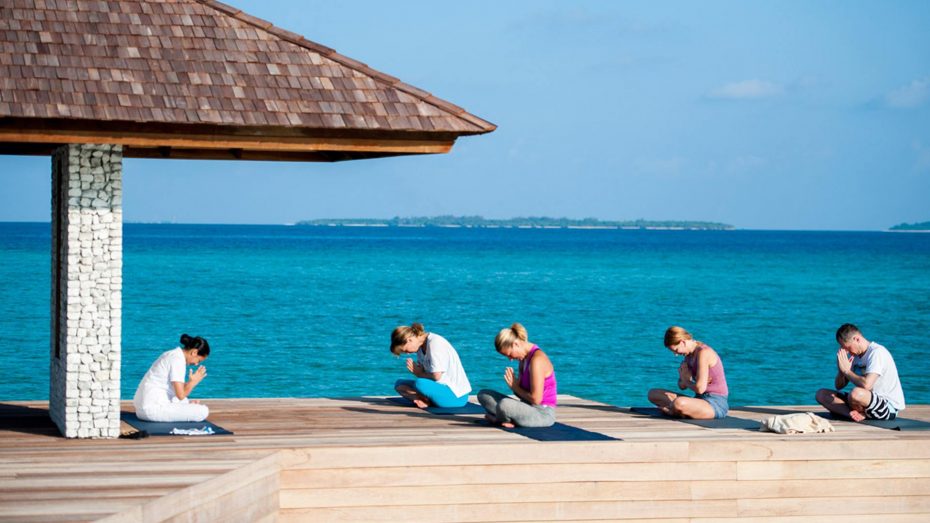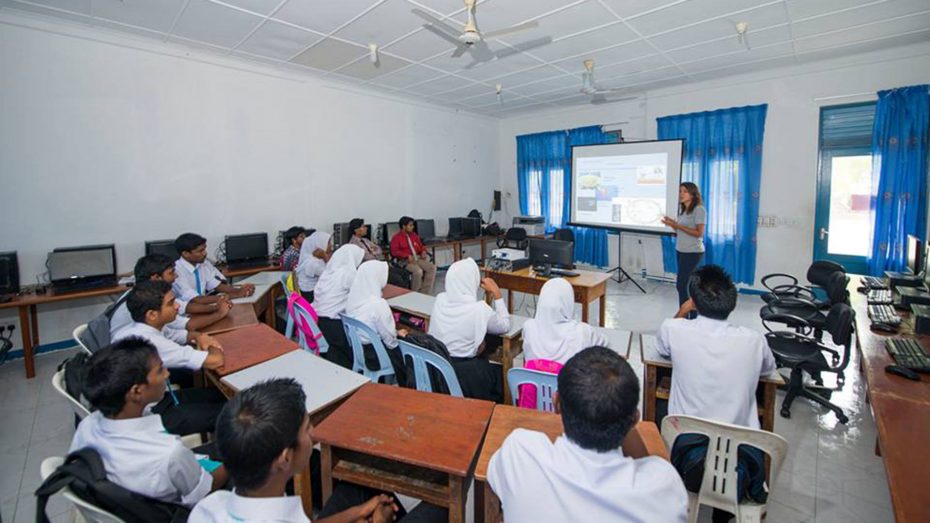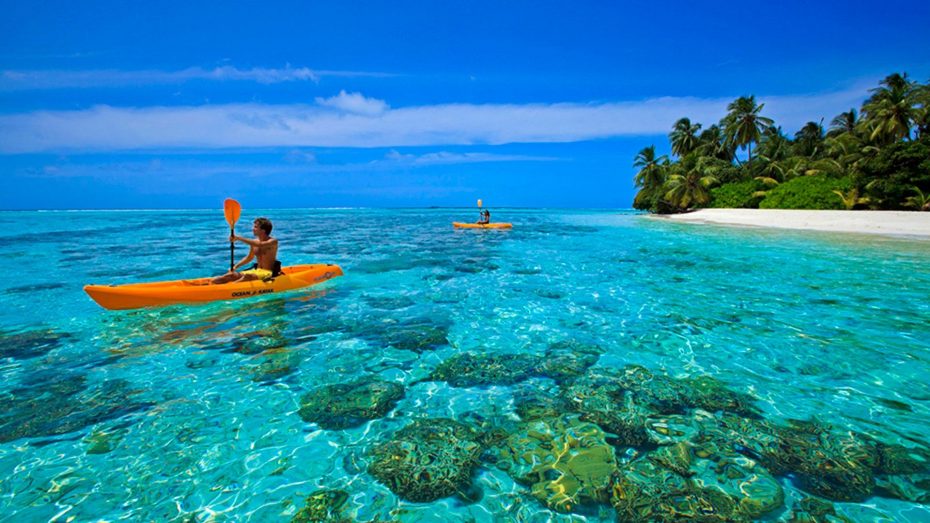Sustainable Maldives
9 Days
ABOUT THE ITINERARY
Maldives have changed over the years and the private luxury islands are no longer the only option! Now we are able to offer you an alternative accommodation for eco-conscious travelers wishing to discover the traditional lifestyle and to dive one of the world’s most amazing underwater realms, without giving up to the quality and standard typical of Maldivian beach resorts. This itinerary is designed to give you an overview of the local lifestyle, history and fragile environment of the Maldives. It is the perfect way to experience the culture, learn about sustainable practices and activities on the capital island, before moving to Hanimadoo Island to enjoy some relaxation in a peaceful and welcoming environment, surrounded by white sand and pristine waters. The first three days will be dedicated to the discovery of culture and traditions, as well as providing an overview about the Maldivian ecosystem and what can be done, even during our stay, to preserve it. There will be an opportunity to meet some NGOs that aim to protect the beaches and coral reefs of the Maldives. You’ll also enjoy traditional delicacies while dining with local families and explore the capital’s most hidden and unknown corners, off the beaten path. Afterwards we will move to the selected eco-resort, which follows the Ecotourism principles of uniting Sustainability and Conservation, involving the Local Community within its activities.
The newly founded Hanimadhoo Conservation Center carries out activities of environmental supervision thought and developed to reduce the impact on one hand, and contribute to the monitoring of biodiversity and to the Local Community economy, on the other one. Here you will have the chance to concretely contribute to the process, for example joining the “conservation snorkeling” within a monitoring framework. You can join the centre activities to discover its daily marine research efforts to carry out programmes within the structure and get involved by the marine biologists in their scientific work. The staff do not simply watch dolphins and mantas, they monitor them with tourists help! Thanks to these activities they can gather biologically-significant evidence showing short and long-term population dynamics and behaviours of these wonderful species. Travelling with us you will not only enjoy a pearl of the Indian Ocean but will concretely contribute to Conserve Maldives learning tons of biological and ecological facts on the wildlife that inhabits this environment.
The resort is located within an almost pristine forest on the local island of Hanimadhoo, in the preserved deep North of Maldives. This 4-star Eco resort is well connected to Male International airport by numerous daily 45-minute flights. The dense vegetation allows not only privacy, but the opportunity to experience untouched nature and the genuine, natural Maldives along with all the amenities expected from a charming accommodation option.
A half mile private sandy beach and a turquoise lagoon frame the hotel inviting you to experience an authentic and relaxing holiday at outstanding value.



SIGN UP FOR THE TRIP
Registration can be requested for group travel or for self-travel. For group travel, registration is not binding. Upon reaching the minimum number of members necessary for the formation of the group, usually 4 or 6 people, you will be asked for confirmation of booking and payment of a deposit.
JOURNEY OVERVIEW AND PROGRAM DETAILS
DAY 1: ARRIVAL IN MALÉ
Male
Arrive at Malé International Airport where you will be greeted by our representative who will assist you with your public bus transfer to your guesthouse on Hulhumale. Upon arrival at your guesthouse, you will have time to settle in after your flight before taking your first steps on the sands of this tropical paradise. Around 2 pm you head south to a beautiful sandbank set in a blue lagoon approximately 40 minutes from the capital. Relax on the sands under the shade of a sun umbrella, swim in the warm waters, or snorkel the house reef. An ideal location to learn to snorkel with your guide or refresh your skills. Leaving the sandbank visit two of the best snorkeling points close to Malé. Sites vary, depending on weather and current conditions, but you can be guaranteed an abundance of colorful tropical fish and coral life. Following a safety briefing and advice on how to be a responsible snorkeler, put on your provided fins, mask, and snorkel and jump into the warm, azure waters of the Indian Ocean. Keep your eyes open for sea turtles, reef sharks, and rays — youngsters will want to be on the lookout for Nemo (aka clownfish). Your snorkel guide will not only act as your ‘spotter’ to point out marine life that may not have caught your eye but will also assist less confident or inexperienced snorkelers, ensuring your equipment is comfortable and you feel safe in the water. As the sun begins to set, turning the sky to a blaze of color, your boat captain will head to the east of Hulhumale to a channel where there is a high probability of encountering dolphins. As magical marine creatures in their natural habitat, there is never a guarantee of sightings but when we are lucky, we can watch them jump and perform! Don’t swim? Don’t worry we provide buoyancy aids for all non-swimmers and our guides will provide instruction and coaching on how to float, snorkel and utilize the equipment. Our guide will assess your confidence and ability in the water to ensure it is safe to proceed to a coral reef area for your first snorkel encounter.
Overnight in Malé (B)
DAY 2: MALE CITY TOUR AND LOCAL FAMILY DINNER EXPERIENCE
Malé
After breakfast, explore the capital on a Male city tour with your guide. Visit the fish market and local market, President’s Palace, Sultan Park, Friday Mosque. Step off the beaten track and explore the lanes and hidden squares. Complete your tour with a bird’s eye view from one of the city’s tallest buildings Your tour starts with an overview of Malé and the harbor area, a very important aspect of any island nation. Passing by the oldest school in the city, learn about the education system and why the Maldives has a 98% literacy rate. Visit Hukuru Miskiiy – Old Friday Mosque and the tomb of Abu-al-Barakaath and learn why the Maldives converted to Islam and how the Islamic faith underpins everyday life. Stop for a refreshing cup of traditional black tea at a local cafe, a popular spot for locals. Find out the importance of betel nuts and try them for yourself! Stopping at the November 3rd Memorial, hear the story of how 8 brave military servicemen died in the protection of their country from a terrorist attack in 1988. Wander through Sultan Park, a reference to the time the Maldives was governed by a sultanat now developed into a peaceful oasis in the middle of the city. Walking back towards the harbor area, pass by the Grand Friday Mosque and the Islamic Centre, Malé’s famous architectural landmark, and onto Jumhooree Maiden – Independence Square. From here, learn the meaning of the Maldives national flag and pick out key government buildings. Heading west along the harbor, visit the bustling fish market and the local market, where the sights, sounds, and smells will fill your senses. Chat with the local stallholders and taste tropical products and homemade sweets. The tour ends at the top of one of the city’s tallest buildings, providing a great backdrop to your final tour photo image! This evening, enjoy dinner with a local family in their home giving you authentic access to Maldives local life.
Overnight in Malé (B, D)
DAY 3: EXPLORE VILLIMALE AND DISCOVER SUSTAINABLE ACTIVITIES
Malé – Villimalé
A short 10-minute ferry crossing takes us away from the hubbub of Malé city to the island of Villimalé. Formerly a prison island and once a resort, Villimalé provides a haven of tranquillity for its residents, many of whom commute to the capital daily. We will meet a member of a local NGO, started in 2008 as a youth movement in Villingili (now named Villimalé) to conserve the beaches in Villingili. This NGO has also planted trees in and around Vilingili and organizes community activities throughout the year. A 60-minute walking tour of the island provides an insight into the conservational challenges that face an island during development by showing how Villimalé has transformed from an island with rich biodiversity on land and in the sea, to one that is struggling to maintain its natural ecosystems. You can witness these impacts firsthand with the local conservationists during the tour and they will show you images of Villimalé’s past as you observe the present. You will see a presentation that will cover the challenges for conservation vs development, safe snorkeling, and dive practices, and provides details on how you can make an active difference at the coral nursery on the Villimalé reef. Head to the local dive school and meet with the team that supports the reef conservation efforts. You will be shown how to perform the tasks that may be assigned to you by the dive/snorkel leader before entering the water. Once out of the water, your guide will take you to a local tea shop where you can sample traditional ‘hedhika’ traditional sweet and savory snacks served with black tea and taken between 3.00 and 5.00 pm. When it is time to leave your guide will walk with you to the ferry terminal and accompany you back to Malé.
Overnight in Malé (B)
DAY 4: TRANSFER TO HANIMAADHOO
Transfer to Malé airport, and domestic flight to Hanimadhoo; then transfer by car to the resort. Free time to enjoy the wonderful atmosphere of the eco-resort and to discover all the services available, such as the well-equipped fitness centre and the private beach, the seawater pool, the Spa, the Conservation Centre and the diving centre. Take some time to plan your week.
Overnight in Hanimadhoo. (B)
DAY 5: RELAX ON THE BEACH
Free day to relax on the beach, at the resort’s pool or at the resort’s SPA.
Overnight in Hanimadhoo (B)
DAY 6: RELAX ON THE BEACH
Free day to relax on the beach, at the resort’s pool or at the resort’s SPA.
Overnight in Hanimadhoo (B)
DAY 7: SNORKELING FOR CONSERVATION
After breakfast, join marine biologists to snorkel and admire the coral reef.
After breakfast join the resident marine biologist for a snorkeling trip to the coral house. You will have the chance to concretely contribute to the activities of the Coservation Center, while joining this “conservation snorkeling” within a monitoring framework. In this way you can join the activities of the center as to discover our daily marine research efforts to carry out programmes within the structure and get involved by the marine biologists in their scientific work. The Conservation Center has developed a series of ‘responsible activities’ for tourists (such as snorkeling, dolphin watch, etc.), so that a double goal can be pursued: “fun” for the tourists and environmental monitoring. After the tour relax on the beach or explore on your own the activities of the resort.
Overnight in Hanimadhoo (B)
DAY 8: BIKE CULTURAL TOUR
In the morning you start at the discovery of the cultural diversity of Hanimadhoo island by bicycle. Hanimadhoo island is authentic and locals warmly welcome all visitors. During this cycle tour you will discover the tradition and cultural of the people living in the island. You will have the chance also to get to know specific environmental education programs in collaboration with the local school. Rest of the day feel free to relax on the beach or go for snorkeling.
Overnight in Hanimadhoo (B)
DAY 9: TRANSFER TO THE AIRPORT
Transfer to Malé airport and departure by international flight.
ACTIVITIES
- Escape the hustle and bustle of city life and relax on beautiful white sandbanks.
- Snorkel at two spectacular locations to discover the Maldives’ unique marine ecosystem.
- Experience snorkelling safely, accompanied by expert guides
- Taste the authentic Maldivian cuisine
- Learn about local culture with a Maldivian family
- Visit Malé’s landmarks on a guided city tour.
- Discover marine conservation activities with a local NGO in Villimalé.
- Relax on the beach equipped with straw umbrellas and sunbeds for sunbathing,
- organize a dive at the diving centre, which guarantees the highest level of quality and professionalism
- do yoga in the open air, in the middle of nature
- Join Dolphins tracking boat expeditions
- take bike tours to discover the local environment and culture
- relax in the seawater pool
- discover the environmental activities of the Centre for Conservation
- night snorkeling
- Relax in a spa where treatments combine spiritual and meditative experiences to achieve well-being of body and mind
DESTINATION
Malé is the densely populated capital of the Maldives. Its fame is linked to mosques and brightly colored buildings. The Islamic Centre (Masjid-al-Sultan Muhammad Thakurufaanu Al Auzam) includes a mosque, a library and a distinctive golden dome. Near the port, a popular fish market sells the result of the day’s catch, while the fruit and vegetable market overflows with fruit from the area.
Hanimadhoo island is located in the North and it is one of the most beautiful islands of Maldives: lush vegetation, long beaches and turquoise lagoon. It opens the door for an adventure and genuine gateway where to be spoiled with a true Maldivian warm hospitality.
Hanimadhoo is a quiet fishing village with lots of tree-shade and swings. Fishing and agriculture is what most of the 2000 habitants of the island do for work.
It is a typical island custom that everyone finish their work by late afternoon, take their daily shower or bath near their wells, dress the children in fresh clothes and go for a stroll in the island, visiting friends and relatives, delivering small bowls of fresh homemade curry or taking some time to relax at the beachside, watching the late afternoon sun while children play around the beach.
Hanimadhoo community services: school, mosque, health center, climate observatory, local village, police station, airport.
SOCIAL AND ENVIRONMENTAL IMPACT
The Eco-resort follows the principles of eco-sustainability and conservation of the environment as well as the involvement of the local community within its activities.
The resort has built its structure including important “green” aspects, including:
– The use of ecologically grown wood, respecting the sustainability of the forest of origin.
– The use of solar photovoltaic panels to generate electricity, limiting the use of diesel generators (widespread and impacting in the Maldives).
– The demand of electricity not covered by the panels is provided by Hanimaadhoo power house, avoiding the establishment of a second diesel power house on the island.
– The use of a system recovering the heat generated by air conditioners to heat the water of the rooms.
– The opening of the water bottling plant by 1st November 2015 in order to reduce the use of plastic bottles and thereby the negative effects that plastic pollution has on the oceans – and consequently on the whole planet.
– The establishment of a Conservation Center. The Center has developed a series of ‘responsible activities’ for tourists (such as snorkeling, dolphin watch, etc.), so that a double goal can be pursued: “fun” for the tourists and environmental monitoring. Our marine biologists “takes advantage” of the excursions to carry out several projects of environmental monitoring, in order to collect data on the ecosystem and monitor the impact of the Eco Hotel activities on the environment. These activities, developed in a context of monitoring and conservation, also have a strong positive effect on tourists, who rise greater environmental awareness and feel more involved in a global change of attitude towards the environment.
The involvement of the local community is done in several ways, including:
- The direct economic involvement of the community, through the contracting of people from Hanimadhoo for many work positions within the Eco Hotel.
- The dissemination of knowledge on the environment and culture of Maldives, especially of Hanimadhoo, through specific activities for tourists (cultural guided cycling tours, escorted exploration of the forest).
- All goods (including food) available on the island are purchased on site, in order to promote the local economy and reduce the carbon footprint due to transportation.
- The development of specific environmental education programs in collaboration with the local school.
- The development of a project of waste sorting within the Maldivian families of Hanimadhoo, the very first step towards recycling.
In addition to this, all the staff at resort works every day to improve the environmental and social situation of the island.
TIPS BEFORE DEPARTURE
Maldives, despite being a famous tourist destination, is a very orthodox and conservative state, therefore when outside the resort it is advised that you following carefully a code conduct which respects local culture to avoid any hassles or unwanted troubles along your journey. In particular, avoid to show affection in public places, such as hugging, kissing etc., as this behaviour is not appreciated by local people.
Guests should bring practical and informal summer clothes, without forgetting a sun hat, sun glasses, sun cream and rubber shoes. Dress code: both in daytime and in the evening, it is not permitted to enter the bar and restaurants in bathing suits or with wet clothes and guests are requested to always wear at least a T-shirt in these areas. In the evenings and after dinner, bermuda shorts and wraparound skirts are allowed. Guests are more than welcome to go barefooted anywhere on the hotel. Nudity is strictly forbidden.
Children are most welcome. Parents are kindly requested to look after their children avoiding situations which could spoil the tranquility and atmosphere which is typical of the resort. We also recommend to avoid situations and activities which may lead to dangerous consequences. Children, who must be at least 8 years old, can take part in the Padi “bubble-maker” courses, whereas children, who must be at least 10 years old, can take the “junior open water diver” license.
It is absolutely forbidden to import underwater spear guns; sacred images or statuettes; pork meat or sausages; alcohol of any type; pornographic magazines; videos and DVDs’ (except for unused videos and DVDs still in their packaging). Nor is it allowed to bring in domestic animals of any kind. Very severe penalties are in force against the importation and use of drugs. It is strictly forbidden to export turtle shells, coral and shells not bought through legitimate commerce. In the interests of the environment, it is forbidden to break or walk on coral.
The reef appears to be like a rock, but in reality it is a collection of millions of organisms: the touch of a fin for example may be sufficient to destroy many years of nature’s work. Some species of coral can cause injuries like cuts and blisters. For your safety and the one of the reef, we would like to encourage you not to stand, walk or swim too close to the barrier. It is forbidden by Maldivian law to collect coral, shells or sand from the Maldivian waters. The government is very strict about it and ignorance might very well end up in cash penalties. Alcohol is not allowed in local islands.
It is kindly requested that the guests bring back with them certain wastes such as empty tubes, used batteries, etc. that could damage the environment!
In order to make full use of the hours of sunlight the hotel is one (+1) hour ahead of Male Time. It is advised that you get onto Maldives’ time zone as soon as you leave home and try to eat and sleep on Maldivian time.
HOTELS
The Eco resort is an ecological touristic structure that follows the Ecotourism principles of uniting Sustainability and Conservation, involving Local Community within its activities. The resort has maximized the Sustainability of the structure, intended to have minimal impact on the local environment and reduce its carbon footprint. It is a Natural Health Retreat where body and spirit are nurtured and restored.
The resort has a total of 52 rooms, of which 40 high standard and fully furnished in two storey blocks of 4 rooms:
• 20 Beach Front (on the grand floor with direct acces to the white sandy beach);
• 20 Ocean view (Upper floor with a spectacular view);
• 12 seaside rooms (affordable and confortable accommodation just few steps away the beach).
TRANSPORT
Public transport from Malé Airport to your accommodation is included. Sea transfer from Malé to Villimalé (round trip) is included
45 minutes of domestic flight Malé International Airport plus 15 minutes by car from Hanimadhoo Airport to the Eco-resort.
WHEN TO GO
The Maldives enjoy a year-round tropical climate, subject to the influence of the monsoons, winds that blow in different directions according to the seasons. December to May is considered to be the best time to visit Maldives. There are two seasons: the dry season of the “Iruvai”, monsoon from the Northeast, from December to May, and the rainy season of the “Hulhangu”, monsoon from the Southwest, from May to November. The wind that brings the rains blows from the southwest towards the northeast, whereas the winter monsoon (which brings the good weather) blows from the northeast to the southwest, bringing the dry season with little rain. Temperatures average 28°-31° all year round. The water temperature is always pleasant, around 27°-29°.

